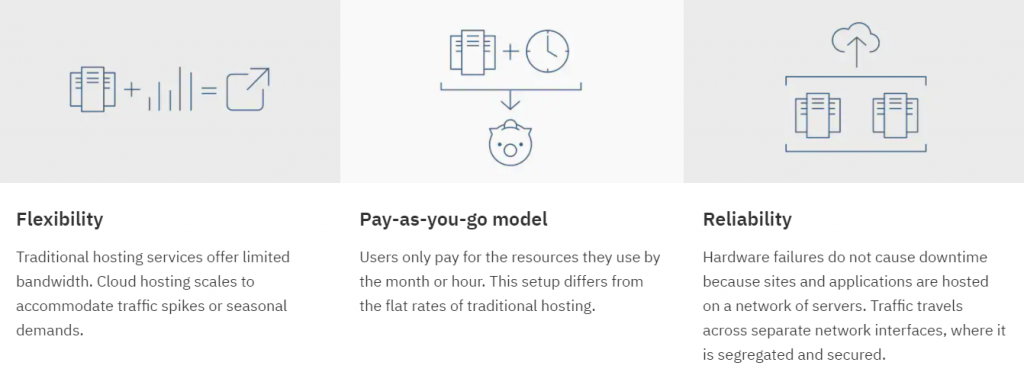Cloud Hosting And Cloud Services Are Growing Faster Then Ever
What is cloud hosting?
Cloud hosting makes cloud resources available to apps and websites. Solutions are not placed on a single server, unlike traditional hosting. Instead, the application or website is hosted by a network of linked virtual and real cloud servers, allowing for more flexibility and scalability.
Key Features:
- Instead of a single on-premises server, applications and solutions are deployed over a cloud network.
- Resources can be scaled to meet the demands of the user.
- Organizations are only charged for the resources they consume.
- SQL (including MySQL) and NoSQL databases may be hosted in the cloud.
- APIs, online portals, and mobile applications are used to automate and control solutions.

Cloud hosting considerations
Security
Clients should look for a supplier that offers solutions for physical/operational, network and system, and application and data security.
Sensitive information
Enterprises that operate with sensitive data may want to explore isolating data at the hardware level, utilizing dedicated servers, or using other methods.
Support
Cloud hosting companies frequently provide tools and, in some cases, specialized services to aid in the management of the cloud-hosted environment.
Performance
Latency in performance might be a problem at times. Organizations should guarantee that their Internet connections are stable and dependable.


BEST CLOUD HOSTING
Cloud hosting plans resemble virtual private server (VPS) web hosting plans in that you pay for a specific amount of web space, RAM, CPU time, and bandwidth up front. However, because these resources are distributed across several devices rather than just one, altering your plan later – for example, adding another gig of RAM – is usually as simple as moving a slider, with the extra power coming online in seconds.
Additional small company web hosting choices exist, such as ecologically friendly green web hosting. Furthermore, cloud hosting is scalable and may be a suitable alternative to a dedicated server with a colocation provider, and managed web hosting services are available.
Everything from email hosting to updating your corporate server may be done with cloud hosting. If you want to get your hands dirty, anticipate the virtual servers to run Linux rather than Windows.
- Google Cloud
- Amazon AWS
- IBM Cloud
- Microsoft Azure
- Hostinger
- Hostgator
- Cloudways
- Bluehost
- Dreamhost

Technical View on the Cloud hosting and services
From an IT standpoint, both the customer and the service provider want the flexibility of quick solution deployment for changing business needs. It’s difficult to deploy a new solution within weeks in a well-established organization with a lengthy history of IT projects without significantly compromising current infrastructure or available financing. Cloud hosting offers the benefits of faster solution deployment as well as cheaper installation and operational costs.
Today’s businesses have enough expertise with cloud hosting to prefer it to traditional application deployment. It is not only faster to deploy in the cloud, but it also assures that the deployment’s scalability, availability, and performance requirements are met.
Cloud service providers (of which there are many) have also improved their services and delivery models, making it much easier to fulfill service-level agreements (SLAs) with more confidence and success. Cloud hosting solutions have emerged to provide centralized and streamlined IT management and services.
This centralized management method assists both the service provider and users in automatically creating, providing, and tracking SLAs over the web. The majority of cloud hosting services are given instantly through an easy-to-use, web-based user interface for software, hardware, and support requests. Updates to software and hardware can also be done automatically. It’s as simple as purchasing online!
As a result, cloud hosting continues to be a popular deployment choice for customers across all sectors. If you haven’t already done so, now is an excellent moment to investigate cloud hosting as a strategic alternative.
How Important Is A Domain Name For Your Business-Organization
Domain name to choose?
One of the most crucial aspects in creating your brand or organization is selecting a domain name. Your domain name is frequently one of the first things people see, and it may influence how they perceive your website and brand. A well-selected domain name may enhance user interest and generate online traffic, but a poorly chosen domain name can have the opposite effect.
Any domain name, after all, is the most important aspect of your website. It may make or destroy your business, therefore picking the right domain name is critical.
But, hold on a second, why is your domain name so crucial?
It’s all about making a good first impression. The first thing your visitors will notice is your URL. A good domain name may leave a favorable and lasting impression on visitors, but a poor domain name might drive them away.
It has an impact on SEO. Exact match domains (EMDs) are no longer required, but keywords in your domain name might still help you rank higher in search engines.
It establishes your company’s identity. Your domain name is a branding opportunity, which we’ll discuss in a moment. Brand recognition may be improved with the appropriate domain name.
While selecting a name that reflects and promotes your business isn’t an exact science with few definite rules, there are certain guidelines to follow.
How to Choose a Good Domain Name

Length
Less is more when it comes to domain names. Users are more likely to locate you with shorter names since they are easier to remember and write. When there’s less to read, it’s also simpler to stand out. It’s best not to use more than 2-3 words.
Simplicity
You want visitors to remember and type your domain name correctly. It might be difficult to recall and spell complicated or rare words or names.
Keywords
Relevant terms aid users in finding you in a search and quickly recognizing what you do. Keywords might be related to what you do or sell (for example, “coffee” or “cleaning”), as well as your location. Incorporating your location (such as “miami”) into your domain name may also assist you in reaching out to local consumers and users.
Name of the business
Your brand should be reflected in your domain name, and vice versa. Because brands take time to grow, adding your distinctive brand name in your domain may help you stand out, earn awareness, and improve website traffic. Make cautious not to use any existing brand names or trademarks while coming up with your brand name and domain name.
Name of the website
While it may seem self-evident, your domain name should be the same as, or as near to, your brand name as feasible. You don’t want visitors to be confused if they put in your domain name and end up on a different website.
Good, but not flawless
Many individuals waste time attempting to come up with the perfect name when they might be spending that time creating a fantastic brand around a perfectly excellent domain name. Don’t put off beginning your business or project because you can’t find the right domain.




